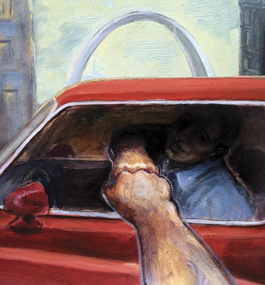Turning Points
What's Next?

Tonya Engel
by Terrell Gilkey '15
It was an ordinary day, a cloudy midsummer day at the Orr-Weathers public-housing projects, in East St. Louis, Ill. I was with two friends, hanging on the street corner like so many other young men in my neighborhood do.
A few nights before, we were on the same corner when a car drove by and began firing shots in our direction. The intended targets were probably up the street from us, but we knew all too well that only the shooter had a target, not the bullets. D., one of the guys I was with, found safety under a parked van until the shooting stopped, while my other friend, Q., and I dived into nearby bushes.
Now we were regaling one another with stories of how we had managed to dodge the bullets that night. A friend walking by heard us bragging about our inner-city survival skills. “Y’all do the most,” she said, playfully mocking us. Unhappy with her put-down, I went to throw my Kit Kat wrapper at her, but D. had already ruffled her newly done hair.
Just then, a cherry-red drop-top Chevy Monte Carlo drove by and suddenly reversed.
Over on the far street corner, “Fatty,” a neighborhood regular who is probably a drug dealer, moved his hand toward his waistband as if to reach for his piece.
The Monte Carlo driver, an older man in his mid-30s or 40s, saw Fatty’s skittish reaction and said to him, “Say, young brother, I don’t mean no trouble. Just want to rap to these young cats.” He motioned toward us.
“You shouldn’t go doing [expletive] like that,” Fatty said. “My nerves are bad from having to watch my back all the time.”
The driver apologized, then turned to us. “I see y’all thundercats out here hanging on the block, cooling with the ladies and all that,” he said. “But what’s next?”
That wasn’t a question I ever asked myself as a kid. It wasn’t a question anyone ever asked me — or asked anyone I knew, for that matter. In fact, if you had told me when I was growing up at Orr-Weathers that I’d one day be a Brandeis University graduate, I would not have believed you.
Sometimes, I didn’t think I’d live to see my high-school graduation, let alone graduate from college. So many people fall victim to the raw and unforgiving reality of East St. Louis that college is the furthest thing from almost everyone’s mind.
Crime and violence are as normal as Saturday-morning cartoons. Several of my seven brothers got caught in the city’s downward spiral. I lost two older brothers to the streets; some of my brothers did time.
I knew I had to take a different path. When I started high school at Southern Illinois University Edwardsville’s East St. Louis Charter School, I entered a new world. Principal Anthony Neal saw me squinting at a hallway sign and arranged for me to get glasses. He heard about my performance in my classes and got me involved in extracurricular activities like debate, robotics and the school newspaper. He became more influential in my life than anyone I’ve ever known.
Since then, I have asked Mr. Neal why, of all the students he knew, I seemed special to him. “There is potential for greatness in you,” he told me. “I’m just trying to help you see it.”
Though there are times when I see it, there are probably more times when I don’t. I remember being the student who sat in Mr. Neal’s office after getting kicked out of English class on the first day of high school. I remember being the young knucklehead who navigated a world that offered neither sympathy nor sugarcoating. I see a trail that I’ve blazed mostly on my own.
But it was Mr. Neal’s and others’ steadfast kindness and support that helped me realize there was a trail to blaze.
That hot summer day five years ago, when the Monte Carlo driver looked like he was going to give us the “I’ve been where you are” speech, I had something to say. “I’m leaving for college in a couple of weeks,” I told him. My friends announced their plans, too.
The driver reached his fist out his window, and we all bumped it. Before driving off, he told us he was proud of us and we had to keep pushing.
I’m well along the path less traveled by young men and women in East St. Louis. I hope one day my path leads me back home, so I can help others blaze their own trail out of an American Soweto.
Terrell Gilkey is a facilitator at Princeton-Blairstown Center, an adventure-based experiential-education program in New Jersey for at-risk urban youth.
